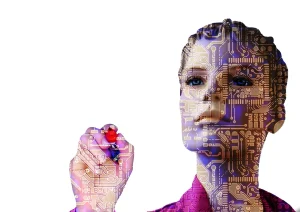
While AI has made significant strides in many fields and has the potential to automate many tasks, jobs and roles are still difficult to fully replace due to the unique human qualities they require. Here are some examples of such roles:
- Human Touch Professions:
- Healthcare: While AI can assist in diagnostics and treatment plans, jobs such as nursing and caregiving require human empathy, compassion, and the human touch.
- Therapists and Counselors: These roles require understanding human emotions and building trust.
- Creative Professions:
- Artists, Musicians, and Writers: While AI can produce art, music, or written content, the creativity, inspiration, and personal touch of humans are unique and irreplaceable.
- Designers: Interior designers, fashion designers, and others who rely on unique insights and aesthetics.
- Strategic Decision-making Roles:
- Executives and Managers: Making decisions that balance data with intuition, ethics, and long-term vision.
- Entrepreneurs: Spotting opportunities and innovative solutions that AI might not recognize.
- Skilled Trades:
- Electricians, Plumbers, and Mechanics: While certain tasks can be automated, many aspects of these jobs require human dexterity and decision-making on the spot.
- Education:
- Teachers and Educators: Personalized learning, understanding student needs, and providing mentorship require human connection.
- Research:
- Scientists and Researchers: Formulating hypotheses, designing experiments, and interpreting complex and nuanced results.
- Human Resources:
- HR Managers and Recruiters: Judging cultural fit, understanding human nuances, and helping resolve conflicts.
- Emergency Services:
- Firefighters, Paramedics: Responding to unpredictable situations and making split-second decisions.
- Cultural and Social Roles:
- Religious Leaders, Social Workers: Providing spiritual guidance, support, and understanding unique cultural or societal dynamics.
- Entertainment:
-
- Actors, Stand-up Comedians: Evoking emotions, humor, and expressions that are deeply human.
- Craftsmanship:
- Artisans and Craftsmen: Jobs that involve creating unique handcrafted goods, such as furniture, jewelry, or traditional crafts, carry a distinct human touch. The imperfections, choices, and artistry of a human hand can’t be wholly replicated by machines.
- Sports and Physical Activities:
- Athletes, Coaches, and Personal Trainers: While machines and AI can provide analytics and guidance on physical performance, the act of playing sports, training, motivating athletes, and understanding the nuances of human physicality remains human.
- Experiential Roles:
- Travel Guides, Tour Operators: Offering personalized experiences, telling stories, and understanding the individual needs of travelers or groups requires human intuition and adaptability.
- Legal Professions:
- Judges, Lawyers: Legal reasoning, particularly in gray areas, requires a combination of logic, ethics, and human judgment. While AI can assist in legal research or predict outcomes based on precedent, the final judgment often requires human discernment.
- Negotiation and Diplomacy:
- Diplomats, Business Negotiators: These roles often involve reading between the lines, understanding cultural nuances, and building genuine relationships.
- Gastronomy:
- Chefs: While robots can cook from recipes, creating new dishes, fusing different culinary traditions, and understanding the palate of different individuals or cultures is an art.
- Field Research and Exploration:
- Field Biologists, Archaeologists, Astronauts: Physical exploration, making observations in uncontrolled environments, and drawing insights from those observations often require human flexibility and intuition.
- Motivational Speakers and Life Coaches:
- Their effectiveness often comes from personal experiences, stories, and the genuine human connection they form with their audiences or clients.
- Childcare and Early Education:
- Babysitters, Nannies, Pre-school Teachers: Young children, especially, benefit from human interaction, understanding, patience, and care which machines can’t wholly provide.
- Roles involving Ethical Decisions:
- Bioethicists, medical ethicists, and others who navigate the complex intersections of morality, society, and emerging technologies.
While AI can complement and augment many of these roles (and in some cases, take over certain tasks), the deeply human aspects of these jobs make them difficult to replace fully. However, it’s worth noting that the landscape is evolving, and what seems irreplaceable today might change with future advancements in AI and robotics. The key for individuals is adaptability and a focus on lifelong learning.